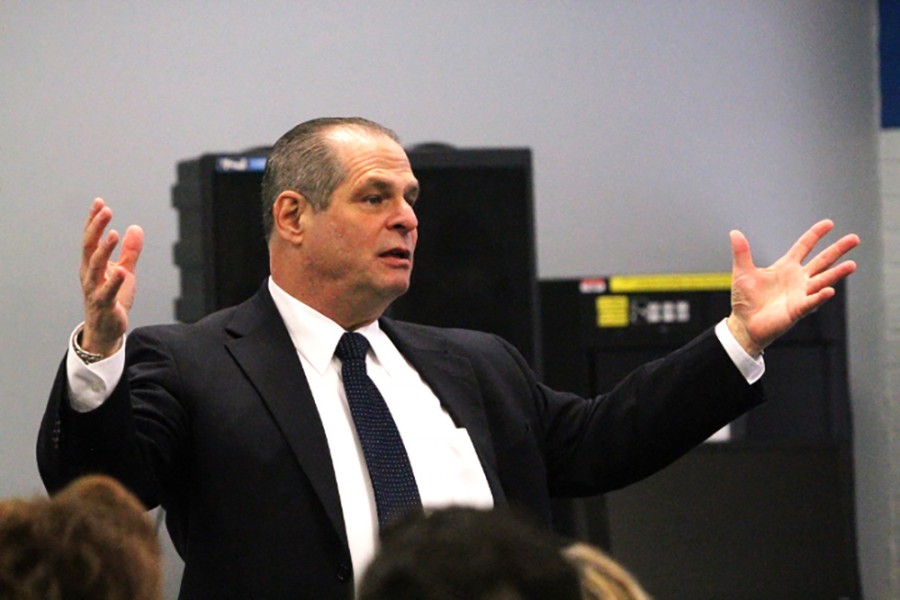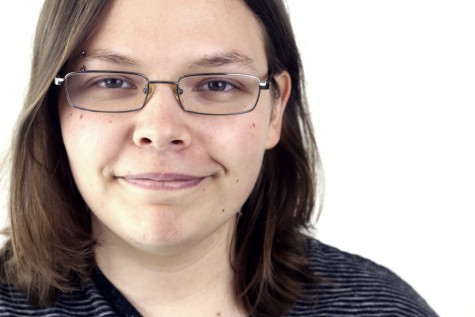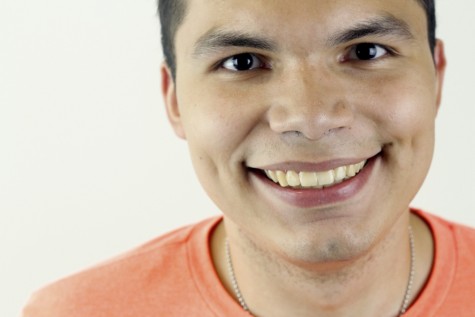Presidential forums continue with second finalist
David Glassman, incoming Eastern president, speaks about budget and staffing during a faculty and staff interview session on Jan. 23 in the Arcola-Tuscola room of the Martin Luther King Jr. University Union.
January 23, 2015
The second finalist for Eastern’s next presidency shared his ideas for the position during open forum sessions Thursday.
David Glassman, the provost and vice president for academic affairs at Bradley University in Peoria, said though he has spent the past five years at a private institution, his passion is with public education, which—along with its location in the Midwest—is one reason Eastern appeals to him.
“I’ve been obsessed with (Eastern). I know more about you than you care to know; I’m like the government right now,” he joked.
Glassman obtained his doctorate and master’s degree in anthropology at the University of Tennessee.
He also obtained his bachelor’s degree in anthropology at the University of Minnesota.
Glassman said he has spent his time in universities similar to Eastern, with 19 years at Texas State University and six years at the University of Southern Indiana.
From 2004 to 2010, he was the dean of the college of liberal arts and a professor of anthropology at the University of Southern Indiana.
Chris Dearth, the director of admissions, asked about Glassman’s vision for enrollment management at Eastern.
Glassman said universities in the Midwest are facing more pressure to be competitive than ever before, and he supports expanding opportunities for international students, including online and blended programs into the curriculum, and becoming more inclusive to the growing population of Latino students.
“It is my responsibility to come in as president to build enrollment,” Glassman said. “The way that will need to take place is by an integrative enrollment plan; it takes distinguishing how Eastern is different and to know how to deliver that message.”
Mary Wallace, the associate athletic director, asked about Glassman’s vision for athletics.
Glassman said he believes division-one athletics are important.
“There is a strong connection to universities through intercollegiate athletics; having said that, intercollegiate athletics needs to have accountability,” he said. “They need to understand what is the revenue and what is the expensive ratio that is taking place, and they need to meet neutrality, just like any other division on the university.”
Glassman talked about his definition of diversity and what his role would be in discussing diversity in the community should he be named the next president of Eastern.
“I look at (diversity) in a very broad sense,” Glassman said. “Diversity, in many factors, can be age related, cultural background, ethnicity.”
Glassman had also said he has been a champion of diversity throughout his career, and he credits that to his being from the Midwest and his time spent in Texas.
Caitlyn Buchanan, an associate resident director, asked Glassman what he would do to bridge the gap between the campus and community.
“Eastern as a campus is diverse, but we find that a lot of our students when they go out into the community don’t always feel welcomed and there’s this dissonance,” Buchanan said.
Glassman said educating people on campus and in the community as well as merging the two groups are important because everyone has unconscious biases.
“It’s hard to change a culture in a very fast way, but the easiest way to change a culture is to integrate and to collaborate and to do so in a very positive fashion,” he said.
Jayme Hardy, a graduate student in the college of student affairs, asked Glassman how he would address Eastern’s lack of diversity among administration and faculty.
He said the University of Southern Indiana had similar problems, as it was hard to find diverse faculty to come to Evansville, but that was remedied with financial initiatives or reaching out to individuals.
“We know as educators as we have a more and more diverse student body, and if our mission is to have these students be successful, then we need to have a more and more diverse administration and faculty,” Glassman said.
David Smith, a history professor, asked how Glassman would assess the effectiveness of the senior administration.
“There has been a failure of leadership among the senior administration at Eastern in helping us confront the many challenges we face,” Smith said.
Glassman said it is important to assess the team one is working with and keep open communicate with everyone.
“I need to understand the strengths, weakness, the interpersonal relations between individuals, and see what is working and what is not working,” he said.
Jack Neal, the general manager for WEIU Radio and TV, asked Glassman how the university would be different a year from now if he were president.
Glassman said he would be working collaboratively on the enrollment issue, which he said is key to sustainability, as well as gaining revenue.
“I will be out fundraising for the university to help us with our scholarships,” he said. “I will be out in Springfield being an advocate for Eastern and trying as best as I can to get the vision of a new science building a reality on the campus.”
Shirmeen Ahmad, a junior journalism major and student vice president for academic affairs, asked Glassman what his relationship would be like with Student Government.
Glassman said resolutions from the Student Senate would be taken seriously and brought to the deans and presidential cabinet, and though they will not always agree, he would always give explanations.
Peggy Brown, an administrative assistant in the school of continuing education, asked about Glassman’s experience with collective bargaining and unions.
He said the universities he has worked at only had select unions for staff members and police; however, he said he was involved in the mediation of grievances, and he is supportive of collective bargaining.
Glassman said in terms of community, he would create new bridges and partnerships and enhance the current ones.
Marschelle McCoy, the biological sciences office manager, said there are many opportunities within the community for students to get involved.
“I tell people, Coles County is the social services capital of the United States, because if someone needs help, there is a program here in Coles County that provides it,” McCoy said.
Glassman said he was involved in an arts organization and served in several boards when he worked at the University of Southern Indiana.
In Peoria, he was part of the Economic Development Center for Central Illinois.
Glassman said that after about two years in a private university, he realized his career would somehow end up back in public universities.
“The reason for that is the students, the mission, the faculty, the environment itself is so deeply ingrained in me,” Glassman said. “As to providing opportunities to students of greatly different backgrounds—diverse backgrounds—and changing students’ lives.”
Stephanie Markham, Debby Hernandez and Luis Martinez can be reached at 581-2812 or dennewsdesk@gmail.com.

















![[Thumbnail Edition] Senior Foward Macy McGlone, getsw the ball and gets the point during the first half of the game aginst Western Illinois University,, Eastern Illinois University Lost to Western Illinois University Thursday March 6 20205, 78-75 EIU lost making it the end of their season](https://www.dailyeasternnews.com/wp-content/uploads/2025/03/WBB_OVC_03_O-1-e1743361637111-1200x614.jpg)






















































